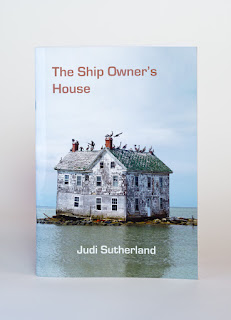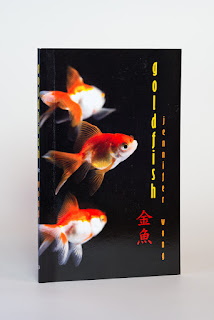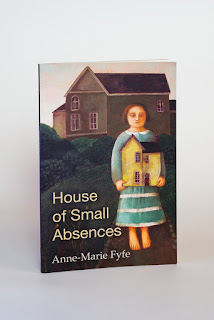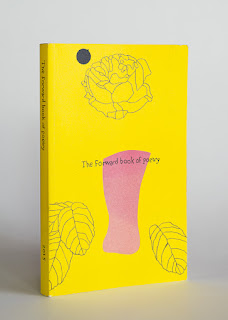Today's poem The poem is Martianism’s flagship in England, literally illustrating human beings’ actions and universe. A Martian Sends a Postcard Home by Craig Raine Caxtons are mechanical birds with many wings and some are treasured for their markings - they cause the eyes to melt or the body to shriek without pain. I have never seen one fly, but sometimes they perch on the hand. Mist is when the sky is tired of flight and rests its soft machine on ground: then the world is dim and bookish like engravings under tissue paper. Rain is when the earth is television. It has the property of making colours darker. Model T is a room with the lock inside - a key is turned to free the world for movement, so quick there is a film to watch for anything missed. But time is tied to the wrist or kept in a box, ticking with impatience. In homes, a haunted apparatus sleeps, that snores when you pick it up. If the ghost cries, they carry
Posts
Showing posts from April, 2019
- Get link
- Other Apps
Today's poem The last two lines are powerful. What is the planet Earth? note, passed to superman By Lucille Clifton sweet jesus superman, if i had seen you dressed in your blue suit i would have known you. maybe that choir boyclark can stand around listening to stories but not you, not with metropolis to save and every crook in town filthy with kryptonite. lord, man of steel i understand the cape, the leggings, the whole ball of wax. you can trust me, there is no planet stranger than the one i'm from.
- Get link
- Other Apps
Today's poem The winter poem cheers readers. At the Entering of the New Year (Homage to Thomas Hardy) The future isn't what it used to be Yogi Berra By John Burnside Since it's not what it used to be, the future is ours, years to regret the bodies we dissolved in Pinot Noir and Paracetemol, a decade or more to walk home in the rain repeatedly, the yard light coming on as if by magic; and, having come this far, can we take it as read that nothing ever happens for a reason, that choosing is out of the question, as is luck, and the surest mistake is to think we already know what matters when we see it? A week of fog; a strange car in the driveway; a doll's house in the front yard, pearled with rain - no one can read the signs, it's not a narrative; if moths know anything of love it has nothing to do with the beautiful doom we long for; and if what we insist on calling fate seems inexplicable or cruel it'
- Get link
- Other Apps
Today's poem Canadian poet's poem on childhood memory This is a Picture of My Father Right After I Was Born by Catherine Owen This is a picture of my father right after I was born. His hair was dark then; his beard a forest with he lake of his mouth in it, grinning. Smiling so intensely, in fact, that he had to hold his head in his hands so it wouldn’t fall apart from happiness and his ignorance over what having me would mean. I was just past blood then, swaddled, and he in scrubs, and we met each other first in that realm, I crying out and he so young in all his confused love for me and somewhere outside the frame my mother was getting stitched up and the slow song of her milk was coming in. (from the website of League of Canadian Poets )
- Get link
- Other Apps
Today's poem A catching moment is the threshold between heaven and hell. The Trout for Barrie Cooke by John Montague Flat on the bank I parted Rushes to ease my hands In the water without a ripple And tilt them slowly downstream To where he lay, tendril-light, In his fluid sensual dream. Bodiless lord of creation, I hung briefly above him Savouring my own absence, Senses expanding in the slow Motion, the photographic calm That grows before action. As the curve of my hands Swung under his body He surged, with visible pleasure. I was so preternaturally close I could count every stipple But still cast no shadow, until The two palms crossed in a cage Under the lightly pulsing gills. Then (entering my own enlarged Shape, which rode on the water) I gripped. To this day I can Taste his terror on my hands. (photo by Susan Derges )
- Get link
- Other Apps
Today's poem In 2017, I heard poetry reading of an African poet, Jack Mapanje, for the first time. His poems reflected political experiences in Malawi. The Seashells of Bridlington North Beach for Mercy Angela by Jack Mapanje She hated anything caged, fish particularly, Fish caged in glass boxes, ponds, whatever; 'Reminds me of prisons and slavery,' she said; So, when first she caught the vast green view Of Bridlington North Beach shimmering that English summer day, she greeted the sight like A Sahara girl on parched feet, cupping, cupping, Cupping the water madly, laundering her palms, Giggling and laughing. Then rubbing the hands On her skin, she threw her bottom on the sandy Beach and let the sea breathe in and out on her As she relaxed her crossed legs - 'Free at last!' She announced to the beach crowds oblivious; And as the seascape rallied and vanished at her Feet, she mapped her world, 'The Netherlands We
- Get link
- Other Apps
Today's poem A surrealistic image in the Morgan's free verse is synchronized with my memory on a photo of a Japanese photographer Michiko Kon. For me, a Scottish term “shoogle” is impressive. The Subway Piranhas by Edwin Morgan Did anyone tell you that in each subway train there is one special seat with a small hole in it and underneath the seat is a tank of piranha-fish which have not been fed for quite some time. The fish become quite agitated by the shoogling of the train and jump up through the seat. The resulting skeletons of unlucky passengers turn an honest penny for the transport executive,
- Get link
- Other Apps
Today's poem A language creates miracles. Do you see the Tower of Babel or another? Eighth Sky BY Michael Palmer It is scribbled along the body Impossible even to say a word An alphabet has been stored beneath the ground It is a practice alphabet, work of the hand Yet not, not marks inside a box For example, this is a mirror box Spinoza designed such a box and called it the Eighth Sky called it the Nevercadabra House as a joke Yet not, not so much a joke not Notes for Electronic Harp on a day free of sounds (but I meant to write “clouds”) At night these same boulevards fill with snow Lancers and dancers pass a poisoned syringe, as you wrote, writing of death in the snow, Patroclus and a Pharoah on Rue Ravignan It is scribbled across each body Impossible even to name a word Look, you would say, how the sky falls at first gently, then not at all Two chemicals within the firefly are the cause, twin shi
- Get link
- Other Apps

The Ship Owner's House by Judi Sutherland (published by VANE WOMEN PRESS, ISBN 9781904409199) The Judi Sutherland’s pamphlet guides me to deeper districts in England. I am fascinated by a list poem ‘In Paddington Station I Sit Down and Weep’, especially, the term “weep” in the title. Her text in the poem takes me into Tokyo Ueno station. Delightedly, I can precisely visualize the poem as if appreciating details of the Pieter Bruegel’s pictures.
- Get link
- Other Apps
Today's poem Eternal love in the poem can also be found in Shakespeare's Not marble nor the gilded monuments . When You are Old by William Butler Yeats When you are old and grey and full of sleep And nodding by the fire, take down this book, And slowly read, and dream of the soft look Your eyes had once and of their shadows deep; How many loved your moments of glad grace, And loved your beauty with love false or true, But one man loved the pilgrim soul in you, And loved the sorrows of your changing face; And bending down beside the glowing bars, Murmur, a little sadly, how Love fled And paced upon the mountains overhead And hid his face amid a crowd of stars. (phot
- Get link
- Other Apps
Today's poem Like seeing Éric Rohmer's film... A Room at the Grand Hotel des Roches Noires, 1971 by Matthew Gregory Madame likes to air the double she takes for eight weeks on the sea-facing east wing. She has written twelve postcards to Brussels in a month. Her tone ー La mer est jolie ー is light and blasé though she counts six instances of the word ténèbres. Arthritis has touched her best hand. Outside the sea glances her way with distance where once everything in the world was a man asking her to dance. On one shelf in ribbons, her empty hatbox deepens into deeper hatboxes that collapse slowly into the green pinochle halls of the pinochle men she knew. Madame dreams in the window chair and sees her postcards from the Roches Noires fly lightly down
- Get link
- Other Apps
Visual poetry Congrats, poet & illustrator Hiromi Suzuki. The magazine Asymptote is novel, rife with young spirits. I have already read work of poets Yuko Otomo and Sawako Nakayasu in the back issues. Spread your work to the world. https://www.asymptotejournal.com/visual/hiromi-suzuki-invisible-poetry/
- Get link
- Other Apps
Today's poem Conflict in mind between Welsh and English is reflected on Lewis' poem . Her interest is overlapped to mine. Mother Tongue by Gwyneth Lewis 'I started to translate in seventy-three in the schoolyard. For a bit of fun to begin with - the occasional "fuck" for the bite of another language's sm oke at the back of my throat, its bitter chemicals. Soon I was hooked on whole sentences behind the shed, and lessons in Welsh seemed very boring. I started on print, Jeeves & Wooster, Dick Francis, James Bond, in Welsh covers. That worked for a while until Mam discovered Jean Plaidy inside a Welsh concordance one Sunday night. There were ructions: a language, she screamed, should be for a lifetime. Too late for me. Soon I was snorting Simenon and Flaubert. Had to read much more for any effect. One night I OD'd after reading far too much Proust. I came to, but it scared me. For a while I went Welsh-only but it was bland and m
- Get link
- Other Apps
Today's poem In addition to the yesterday's poem, here is also a poem on a game. Upon reading the rhymed couplets, first, I giggle with a scene of Christianity and card play for gambling and religion, for an imaginary snapshot that Buddhist monks in clerical garb play Mahjong. However, the scene could often be seen at that age. Such oldness and strangeness in the poem ー I adore. On the Cards and Dice By Sir Walter Raleigh Before the sixth day of the next new year, Strange wonders in this kingdom shall appear. Four kings shall be assembled in this isle, Where they shall keep great tumult for a while. Many men then shall have an end of crosses, And many likewise shall sustain great losses. Many that now full joyful are and glad, Shall at that time be sorrowful and sad. Full many a Christian's heart shall quake for fear, The dreadful sound of trump when he shall hear. Dead bones shall then be tumbled up and down, In every city and in every
- Get link
- Other Apps
Today's poem Basically, I choose poems in my blog that have nourished me. When I read the poem, a person's hand is transformed to stone, paper, and scissors as if with a magic wand exhibiting power "as you will, you will". I also imagine a Hand of Glory from the poem. Song of the Powers by David Mason Mine, said the stone, mine is the hour. I crush the scissors, such is my power. Stronger than wishes, my power, alone. Mine, said the paper, mine are the words that smother the stone with imagined birds, reams of then, flown from the mind of the shaper. Mine, said the scissors, mine all the knives gashing through paper's ethereal lives; nothing's so proper as tattering wishes. As stone crushes scissors, as paper snuffs stone and scissors cut paper, all end alone. So heap up your paper and scissor your wishes and uproot the stone from the top of the hill. They all end alone as you will, you will. ( from the website of Poet
- Get link
- Other Apps
Today's poem A lot of readers might say that Wordsworth's poems are typically 'Tintern Abbey', 'Ode on Intimations of Immortality', 'The Prelude', etc. The blank verse 'Nutting' gave me an aha experience: Wordsworth was a deist. Hardy, too, wasn't he? I suppose that poems of both the poets have an affinity with the traditional Japanese spiritual nature. Nutting by William Wordsworth It seems a day, (I speak of one from many singled out) One of those heavenly days which cannot die, When forth I sallied from our cottage-door, And with a wallet o'er my shoulder slung, A nutting crook in hand, I turn'd my steps Towards the distant woods, a Figure quaint, Trick'd out in proud disguise of Beggar's weeds Put on for the occasion, by advice And exhortation of my frugal Dame. Motley accoutrement! of power to smile At thorns, and brakes, and brambles, an
- Get link
- Other Apps

Goldfish by Jennifer Wong (published by chameleon press, ISBN978-988-1862365) Jennifer Wong is a poet and teacher, born and raised in Hong Kong, now living in London, prolifically writing poems and reviews. Since first meeting at The Troubadour in 2013, I have read her bright poems and translations including themes chiming more than Asia. A poem ‘Regent’s Park’ in the book has a tone with a sort of haiku, though sketching one urban frame in London. Looking forward to her continuous development of creativity. Her recent work (1) Poems from World Literature Today Volume 93, No. 2, Spring 2019 https://www.worldliteraturetoday.org/2019/spring/two-poems-jennifer-wong (2) Reviews from The Poetry Review Vol 109, No 1, Spring 2019 https://poetrysociety.org.uk/publications/vol-109-no-1-spring-2019/
- Get link
- Other Apps
Today's poem The sonnet Ozymandias reminds me of the Japanese poet Matsuo Bashō's haiku. 夏草や The summer grass 兵どもが 'Tis all that's left 夢の跡 Of ancient warriors' dreams (trans. Inazō Nitobe) Ozymandias by Percy Bysshe Shelley I met a traveller from an antique land Who said: Two vast and trunkless legs of stone Stand in the desert. Near them on the sand, Half sunk a shatter'd visage lies, whose frown And wrinkled lip and sneer of cold command Tell that its sculptor well those passions read Which yet survive, stamp'd on these lifeless things, The hand that mock'd them and the heart that fed; And on the pedestal these words appear: ‘My name is Ozymandias, king of kings: Look on my works, ye Mighty, and despair!’ Nothing beside remains. Round the decay Of that colossal wreck, boundless and bare
- Get link
- Other Apps
Today's poem Initially, the first and second lines in the first quatrain grab readers. In order to faithfully build up a relationship to a friend, a lover, or another, a person’s mind, sometimes shadowy parts are read as if with physiognomy or a psychological test, linking to writing onscreen in this case. The last line in the third quatrain is vital, so positive to human beings and the world. I Keep My Eyes on the Ground by Caroline Bird Your penumbra shimmers with small-print in Papyrus font, clarifications mostly, live - feed emotional updates, correction in your shadow’s margins. Your shadow is a thought essay typed on the air, erased and rewritten by your every move, proposals stick-scrawled in the sand as the next wave licks its finger to flip the beach. For you, honesty is constant amendment: your stance shifts and new notes spool out from your feet ー footnotes, revised, a body of dissolving documentation I try to speed-read fast enou
- Get link
- Other Apps
Today's poem There are a myriad of poems adapting nursery rhymes. For example, John Hollander’s ‘The See-Saw’ is created with gorgeous combination of the following nursery rhyme and Hegel’s quote (trans. A. V. Miller). ( https://bit.ly/2X0fgyH (p. 116)) See Saw Margery Daw from Nursery Rhymes See Saw Margery Daw Johnny shall have a new master He shall have but a penny a day Because he can’t work any faster. * Video: https://www.bbc.co.uk/programmes/p04v96n3
- Get link
- Other Apps
Today's poem Wonderfully taut depiction to words with transition of metaphors concerning a body. The Chinese version is on the homepage of a poet Yang Lian. http://yanglian.net/yanglian_en/translate/etranslate_e2c_04.html Unearthly Languages by Pascale Petit I was fluent in the music of the spheres but it faded. So I salvaged one note and kept it under my tongue to fuel my first breath. After my birth, I broke that note into colours with which to see the world ー our home, where I was locked in the cellar of myself. The door has a leash hanging from it, with little bells that shiver, the way frost tinkles on a starry night. Then the door clicks open and I go out and stand naked while snowflakes melt on my skin, like the words of a lost language.
- Get link
- Other Apps
Today's poem The tone is lighter than Ben Jonson's elegy 'On My First Son'. Kennedy's poems are always full of richly playful elements. I found analysis of the poem: Blog of Poet, Translator, Essayist A. M. Juster. http://www.amjuster.net/blog/2015/9/16/the-elegiac-xj-kennedy Little Elegy for a child who skipped rope by X. J. Kennedy Here lies resting, out of breath, Out of turns, Elizabeth Whose quicksilver toes not quite Cleared the whirring edge of night. Earth whose circles round us skim Till they catch the lightest limb, Shelter now Elizabeth And for her sake trip up death.
- Get link
- Other Apps
Today's poem Nothing, the world was unborn, and then — Genesis by Geoffrey Hill I Against the burly air I strode Crying the miracles of God. And first I brought the sea to bear Upon the dead weight of the land; And the waves flourished at my prayer, The rivers spawned their sand. And where the streams were salt and full The tough pig-headed salmon strove, Ramming the ebb, in the tide's pull, To reach the steady hills above. II The second day I stood and saw The osprey plunge with triggered claw, Feathering blood along the shore, To lay the living sinew bare. And the third day I cried: 'Beware The soft-voiced owl, the ferret's smile, The hawk's deliberate stoop in air, Cold eyes, and bodies hooped in steel, Forever bent upon the kill.' III And I renounced, on the fourth day, This fierce and unregenerate clay, Building as a huge myth for man The watery Leviathan, And made the long-winged albatross Scour the ashes of the sea
- Get link
- Other Apps

House of Small Absences by Anne-Marie Fyfe (published by SEREN, ISBN978-1-78172-240-4) A poet and teacher Anne-Marie Fyfe founded and has organized Coffee-House Poetry. The collection consists of four parts, and each begins with a writer's quote: Eugene O'Neill; Antoine de Saint-Exupéry; Tomas Tranströmer; and Julian Barnes. Their origins are all Europe. My favorites in the four parts are respectively 'The House at World's End', 'House of Small Absences', 'Hot, Copper Skies', and 'From the Cockpit Window'. Among them, most attractive is the poem 'The House at World's End' that is an ekphrastic poem on work by a Japanese artist Hiraki Sawa living in the UK now. Some poems are rooted to her Irish heritage. Grace is my impression to this book. Great gratitude to the poet Anne-Marie Fyfe and Coffee-House Poetry again. P.S. If you stay in London, please visit the beautiful Troubadour Café at Earls Court.
- Get link
- Other Apps
My poem with short video clip: Cherry Blossoms Please click below. http://www.inksweatandtears.co.uk/pages/?p=11077 Additionally, a famous spring song here. I Sing of a Maiden by anon. I sing of a maiden That is makeles: King of alle kinges To her sone she chees. He cam also stille Ther his moder was As dewe in Aprille That falleth on the gras. He cam also stille To his modres bowr As dewe in Aprille That falleth on the flowr. He cam also stille There his moder lay As dewe in Aprille That falleth on the spray. Moder and maiden Was nevere noon but she:
